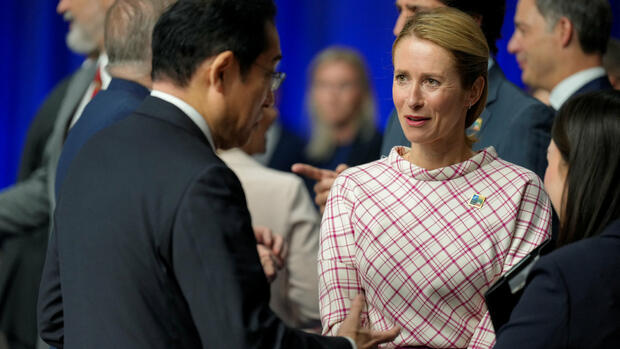Tokyo China has reacted with sharp criticism to Japan and South Korea’s participation in the NATO summit in Vilnius. The English-language mouthpiece of the Chinese Communist Party, the “Global Times”, spoke of a “quasi-alliance” and a “Natoization of the Asia-Pacific region”. The sudden military interest of the Europeans in the region is strange.
After a visit to Japan by NATO Secretary General Jens Stoltenberg, Beijing recently reacted in a similarly harsh manner. Foreign Ministry spokeswoman Mao Ning accused the North Atlantic defense alliance of wanting to expand its sphere of influence beyond its traditional defense zone. The Asia-Pacific region is “not the battleground for geopolitical competition,” and China does not “welcome a Cold War mentality and bloc confrontation.”
Japan, South Korea, Australia and New Zealand are not members of the alliance – nevertheless they played an active role on the diplomatic stage of the NATO summit in Vilnius as so-called NATO value partners. They are concerned with systematically expanding cooperation with the transatlantic defense alliance.
Japan’s Prime Minister Fumio Kishida and South Korea’s President Yoon Suk Yeol agreed on an “Individually Tailored Partnership Program” (ITPP) with Allianz in Vilnius.
Accordingly, Japan will in future work more closely with the other NATO countries in 16 areas and South Korea in eleven areas. These include counter-terrorism, cybersecurity and technological cooperation, but also greater harmonization of standards in weapons and communications.
>> Read also: These are the largest armies in the world in 2023
NATO’s increased military cooperation with Indo-Pacific states is directly related to the increasingly aggressive behavior of the superpower China and North Korea’s threatening gestures.
China’s growing claims to power and North Korea’s nuclear build-up are worrying South Korea.
(Photo: dpa)
Meanwhile, NATO is trying to counter allegations of an aggressive expansion of the alliance. In the run-up to the summit, the idea of setting up a NATO liaison office in Tokyo was dropped after French resistance. Paris fears the alliance could lose focus. After all, the summit communiqué no longer even mentions that this idea should be discussed further.
At the same time, the summit participants made no secret of the fact that China and North Korea play an important role in their deliberations. The final document not only warns of the North Korean nuclear weapons and missile program, but also mentions China in detail. “The declared ambitions and the policy of the People’s Republic of China to exert economic pressure pose a challenge to our interests, our security and our values,” it said, among other things.
China’s support for Russia in the Ukraine war and recent export controls on commodities vital to high-tech industries may have reinforced summit participants’ resolve.
Beijing is accused of using a wide range of political, economic and military instruments to expand its global presence and demonstrate its power. The country does not make its strategy, its intentions or its military build-up transparent. In addition, the summit participants criticize that China wants to undermine the security of the alliance with “malicious hybrid and cyber operations” and with disinformation campaigns.
Other points include China’s efforts to control key industrial sectors, critical infrastructure, and strategic materials and supply chains, and undermine the international order.
A television screen in the train station in the South Korean capital Seoul shows the current rocket launch. News of North Korean ruler Kim Jong Un’s renewed demonstration of power caused concern at the NATO summit on Wednesday.
(Photo: dpa)
Summit participants call on China to end its support for Russia and “condemn Russia’s war of aggression against Ukraine.” However, we are still “open to constructive engagement”.
Why Japan and South Korea are interested in NATO
South Korean President Yoon explained on Tuesday why NATO is gaining in importance for US allies in the Indo-Pacific. “At a time when security in the Atlantic and Indo-Pacific regions are inextricably linked, close cooperation between the Republic of Korea, Japan, Australia and New Zealand with NATO is more important than ever.”
On Wednesday, Yoon then pointed out the dangers posed by North Korea, which is arming itself to become a nuclear power and is considered an ally of China. Shortly before a meeting of the heads of state and government of South Korea and Japan, another North Korean missile test caused a stir. North Korea fired an intercontinental ballistic missile (ICBM) that stayed in the air longer than any North Korean missile, with a flight time of 74 minutes. In April, North Korea had tested a solid-fueled ICBM for the first time – a weapon that experts say could reach any target in the United States.
Yoon called a National Security Council meeting over the missile test. Japan’s Prime Minister Kishida urged his team to gather information on the recent missile test and be prepared for unexpected events. North Korea may already have the technology to hit Japan with a missile armed with nuclear warheads.
More: Why Germany is in danger of missing the two percent target
